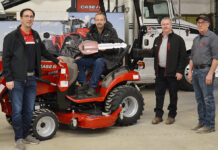What did you know and when did you know it? Were you one of the fraction of Americans who were aware that the Space Shuttle Columbia was due home following a “routine” mission? Or like the most of us, did Columbia only make your radar when it failed to make NASA’s?
Taking for granted. As we all collectively shuddered in gape-mouthed disbelief that something as “common” as a shuttle landing could go so horribly wrong, did it not occur to us how ridiculously easy it was to take the amazing for granted?
That we were so confident in space exploration that we were quite nearly bored with the whole thing? That journeys so miraculous had become so mundane that it became breaking news only if they failed?
That man could break the bonds of gravity and escape the planetary pull to rocket into the reaches of space was a phenomenon just a generation ago.
People gathered around flickering television sets to collectively gasp over “one small step for man.” And the world marveled that a neophyte nation could not only have the chutzpah to enter the race for space – but the unmitigated gall to win.
For all her status as the last true Superpower, America is the baby of the planetary block. Most of the so-called “great nations” have capitols older than we are.
Who could imagine that less than 200 years into her existence America would go toe-to-toe with Russia in the race for space and claim the moon?
Only in America. Moreover, who then could imagine that within one generation we would take this feat utterly for granted? Only in America, some might say. And perhaps they would be right.
Only in a nation borne of the complete confidence that all things are not only possible – but our due. That any obstacle – be it the British Army, vast prairie or deep space – is ours to conquer, would such mundane acceptance of the amazing be possible.
The very name – shuttle – implies the commonplace. As if, perhaps, the astronauts were simply catching the cross-town bus, or one of those little golf-cart trams to hitch a ride back to the car after a long day at Disney World.
It does not convey the gravity of the situation that is the return from beyond the boundaries of Earth itself.
There is no shame in having taken risks. These seven adventurers surely accepted that flight beyond reach of the clouds is always a risk. We should be awed that they took these risks not for adoration, wealth untold, or stadiums packed with cheering masses.
Different ballgame. More citizens were aware of the Super Bowl than the space shuttle. There are no NASA cheerleaders. No lucrative marketing contracts assuring us that all the astronauts wear Nikes, drink Pepsi, or use Aleve for those deep space migraines.
No, these risks were undertaken simply for science and with the knowledge that what could happen – the unthinkable – did. And the “routine” and “commonplace” was anything but in the blue skies over Texas when seven explorers failed to make it safely home. Or at least home to Earth. Godspeed indeed.
The beat goes on. There will be more shuttles. More adventures. More risks. Because that is what America does. She picks herself up, dusts herself off, and starts all over again.
Another scar, some hard-won wisdom, and over 200 years of never say never behind her. Surely others will reach for the stars. Despite knowing that success may breed a sense of accomplishment, but it is likely that only failure will bring fame.
The best and the brightest will accept the challenge while knowing the risks. Ascending to the heavens on a wing and a prayer.
Perhaps, if we’ve learned anything, the next time a few more of the prayers will be ours.
(Kymberly Foster Seabolt welcomes reader comments c/o P.O. Box 38, Salem, OH 44460 or kseabolt@epohi.com.)











